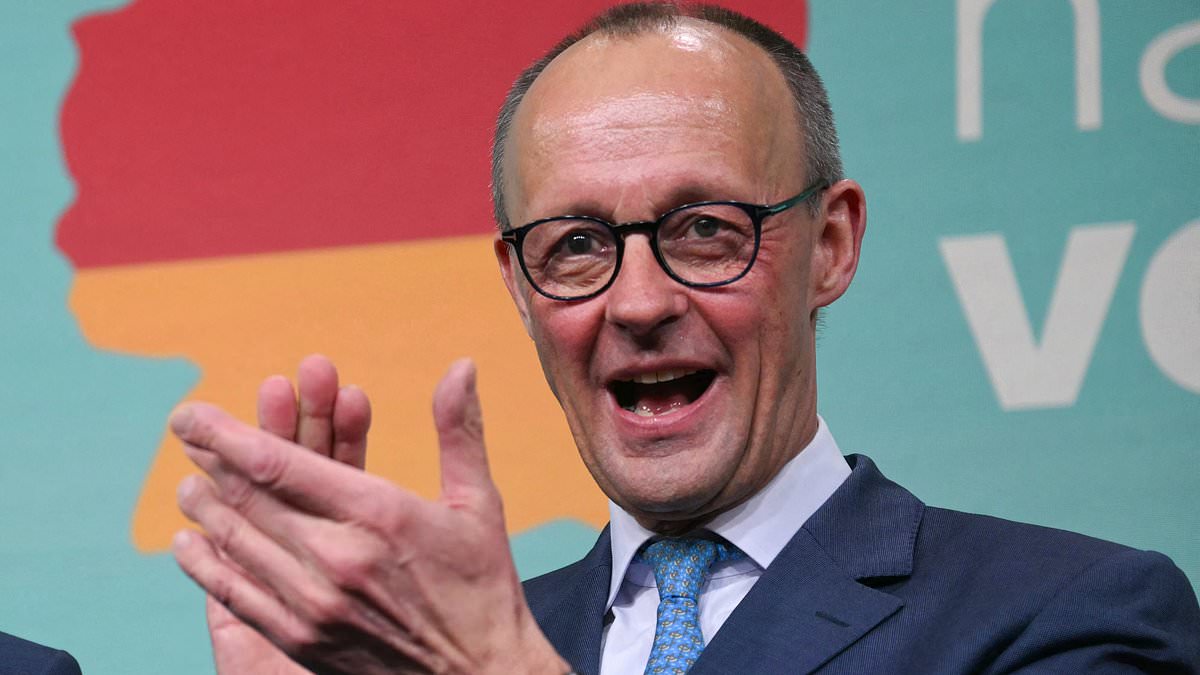With his party topping Germany’s snap election poll, Friedrich Merz looks set to fulfil his lifelong ambition of becoming Chancellor of Germany.
It hasn’t been an easy road for Merz to reach this point.
The politician turned banker looked as though his chance of leading Germany had passed when he left politics altogether nearly 20 years ago following a bitter power struggle between himself and Angela Merkel.
But in a remarkable political comeback the 69-year-old now looks as though he is in touching distance of the chancellory after his party, the CDU, secured 29 per cent of the vote in the February 23 election.
Born in 1955 in what was then West Germany, Merz took an earlier interest in politics.
A staunch anti communist he joined the conservative CDU’s youth wing when he was still in school.
After a brief sting in the army he studied to become a lawyer before he settled on a career as a politician.
In 1989 he was elected as a member of the European Parliament and five years later he won a seat in the Bundestag where he quickly established himself as a leading member of the CDU’s more right leaning pro-business wing.
He also developed a close relationship with Wolfgang Schäuble – who led the party in the German parliament from 1991 to 2000 – which put him in good step to become the CDU’s candidate for chancellor in a future election.
However, in a power struggle that ensued between Merz and Merkel for leadership of the party it was Merkel and her more centrist allies who came out on top.
After which Merz took a backseat in German politics seeing no role for himself in Merkel’s CDU and he later went on to criticise Merkel’s leadership of the party slamming it as ‘idle’. It is widely known the pair were never on the best of terms.
Merz then left parliament in 2009 and instead went into the private sector first as a lawyer again while also taking the helm of Atlantik-Brücke, a lobby advocating transatlantic ties.
He then sat on a series of corporate boards which he claimed provided him valuable experience outside of politics and also led to the father-of-three becoming a reputed multimillionaire.
When Merkel announced she was leaving politics in 2018 Merz saw an opportunity to return to politics.
Running on a right-wing platform, he failed to win the leadership of the party on two attempts. However, following the party’s bruising defeat in the 2021 election, which ended nearly 20 years of uninterrupted government, Merz finally won leadership of his party.
As leader of the CDU, Merz has tried to stop the bleed of votes to the far-right AfD by moving the party’s positions away from the centrism which defined the Merkel government.
On migration he has ditched the Merkel era policy of allowing millions of refugees from Syria and elsewhere to settle in Germany.
Earlier this year he was condemned by other politicians – including Merkel – for voting with the AfD on an immigration bill breaking the so-called firewall in German politics where moderate parties refuse to work with the far-right.
Since the last election the once mighty German economy, which steered the EU through the Euro crisis, has stagnated since the start of the Ukraine war with Scholz’s government struggling to revitalise Europe’s largest economy.
In the hope reviving Germany’s economic fortune, Merz has hinted he could remove the ‘debt brake’ which strictly caps how much Berlin can borrow.
If he relaxes the policy it could open funds for investment in the country’s creaking infrastructure which was once the envy of the world but has suffered from lack of funding for decades.
A self-described Atlanticist, who claims to have visited America over 100 times, Merz seems slightly miscast for the current era which have become frosty since Trump returned to the White House.
Merz criticised Trump for blaming Ukraine for the war and went as far as to claim Trump ‘doesn’t care about Europe’.
Speaking on a TV panel after the exit poll he said: ‘I would’ve never thought I would need to say something like this on television, but after Donald Trump’s statements last week it’s clear: this American government doesn’t care for Europe.’
Merz now faces the task of building a coalition government which could take weeks if not months with Merz saying the negotiations could go on until Easter.
He has ruled out a coalition with the AfD. The most expected outcome of this election is a coalition of Merz’s CDU with the SPD in an uneasy ‘grand coalition.’
Other coalition options include the ‘Kenya coalition’ – named for the colours on the Kenyan flag, which could see the Greens join the government.
Or if the FDP enter parliament they might form a government with the CDU and Greens in a so-called ‘Jamaica coalition’.
Away from his career and politics, Merz has been married to his wife Charlotte Gass since 1981 and the couple have three children.
Merz is also a keen aviator and Mrs Merz reportedly stopped him from buying a private jet until his children had moved.
He now reportedly owns two.
